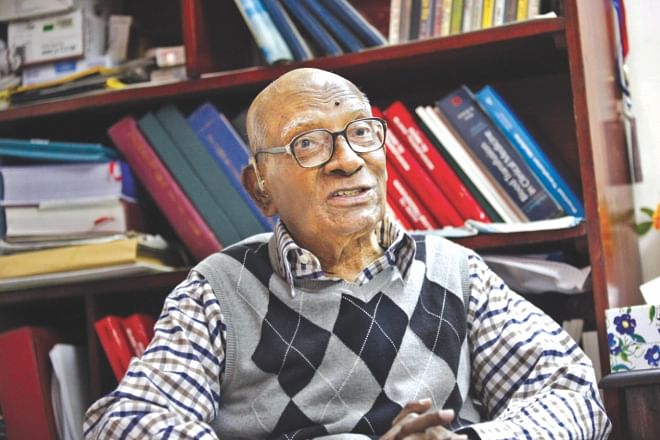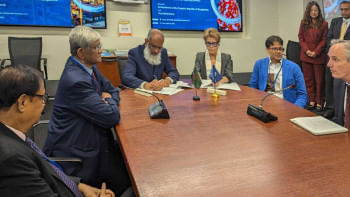Of blood transfusion architect

He is well-known as the architect of the blood transfusion system in the country and has spent his entire life doing groundbreaking research on blood cells.
Prof Dr Mujibur Rahman has received one of the highest civilian awards of Bangladesh for promoting safe blood transfusion services even in the remotest corners of the country, helping people to have access to blood when needed through voluntary donations.
One of the most distinguished scientists the country has ever presented to the world, the 94-year-old won the Ekushey Padak 2014 for social services on February 20.
The seeds of his success were sown seven decades ago when he went to the Berry-White School of Medicine in Guwahati, Assam, after passing the matriculation examination from Sylhet Zilla School. He studied there for four years.
Prof Rahman came back to the then East Pakistan in 1952 and worked for three years at Mitford Hospital, later renamed as Sir Salimullah Medical College and Hospital. He helped set up the Railway Hospital and established a blood bank at Rajshahi Medical College and Hospital in 1962.
He went to the University of Glasgow in 1964 for higher studies and obtained the first PhD in haematology and blood transfusion from South and Southeast Asia.
His groundbreaking thesis comprises the Kell-Cellano blood group system, which was applied to 20,000 blood samples. This was the highest contribution to the blood transfusion area in the world at the time.
He discovered one of the rarest blood groups called the Bombay in two Bangladeshi families. Upon his arrival from Glasgow, Rahman was posted as the blood transfusion officer at Dhaka Medical College and Hospital.
He worked to mobilise blood collection in March 1971 in anticipation of casualties in case of any crackdown by the Pakistani regime following the historic March 7 speech of Bangabandhu Sheikh Mujibur Rahman.
Prof Rahman played a pioneering role in the development of transfusion medicine in Bangladesh and administering the postgraduate course in the subject at the Institute of Post Graduate Medicine and Research (now Bangabandhu Sheikh Mujib Medical University).
He also introduced plastic bags to carry and preserve blood, replacing the age-old bottles. He set up 30 blood transfusion centres during his time in public service, making blood available even in the remotest places of Bangladesh.
He did not stop working after retiring from government service in 1982. He was an honorary member of the World Health Organisation's expert advisory panel on human blood products from 1979 to 2002 as an international expert.
He also helped set up the Blood Transfusion Society in Bangladesh and was its president for nearly a decade.
He has written six books, which are taught at the public medical colleges of the country. He has also conducted and published several research articles that include discovering blood grouping antisera and enzymes Bromoline from Bangladeshi pineapples for detection of irregular antibodies from mangoes and jackfruits for detection of A1 red cells.
Prof Rahman firmly believes blood is not and should not be a commercial commodity.
He also pioneered the idea of encouraging people to donate blood voluntarily. With the help of non-governmental organisations and the media, he successfully convinced people that voluntary blood donations did not cause any harm to health.
Prof Rahman has also promoted the idea of collecting healthy blood from volunteers, not from professional donors. He is against the setting up of blood banks here and there with no government control. "Blood should not be sold at roadside centres," he believes.
He also set the criteria for blood donations now being used across the country.
Prof Rahman opposes the high fees charged by doctors these days. "I practised for 40 years but never set fees. Now everybody has become so commercial!"
He had the opportunity to stay in Glasgow, work as a consultant and lead a life of affluence. But he declined the offer as he wanted to serve a nation in need of his services.
"I was there on a government scholarship. So, it was my duty to come back and serve the country," he told The Daily Star in an interview last week.
Hailing from Badepasha, Sylhet, Rahman never set his eyes on money. "I am not the slave of money."
He thanked the government for honouring his contributions to society while he is still alive. "The recognition is more important than the medal."
A lifelong researcher, academic and social transformer, Prof Rahman lives a very simple life and resides at an apartment owned by one of his daughters, as he does not own any house or even a flat.
Prof Rahman, whose four children and seven grandchildren are all established, spends his leisure time listening to Tagore songs and reading medical journals. Even at this age, he spends a significant amount of time in lecturing, researching and writing.
"I am retired but not tired," he said as he tightly squeezed the hand of this correspondent the latter had extended for a handshake.

 For all latest news, follow The Daily Star's Google News channel.
For all latest news, follow The Daily Star's Google News channel. 



Comments